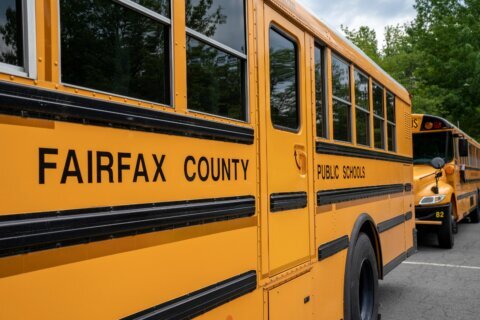This article was republished with permission from WTOP’s news partner InsideNoVa.com. Sign up for InsideNoVa.com’s free email subscription today.
This article was written by WTOP’s news partner InsideNoVa.com and republished with permission. Sign up for InsideNoVa.com’s free email subscription today.
Many Fairfax County Public Schools students were experiencing high levels of anxiety and depression even before the pandemic struck nearly two years ago and county officials are struggling to maintain adequate mental-health staffing to address those concerns.
According to the 2019-2020 Fairfax County Youth Survey of eighth-, 10th- and 12th-graders, 38.3 percent female students reported having depressive symptoms, far higher than the 20.9-percent rate of male students.
Depression increased for both genders with each succeeding grade level.
Hispanic students reported the most such symptoms, followed by black, Asian and white pupils. Those reporting the most symptoms were LGBTQ students, including 36.5 percent of the boys and 56.4 percent of the girls. Similar disparities between the groups occur when studying stress and suicidal thoughts and attempts, said Jesse Ellis, prevention-program manager with Neighborhood and Community Services.
Protective factors such as positive relationships with caring adults, involvement in extra-curricular activities and volunteer service positively affect children’s lives, he said.
“We know that when kids have protective factors or assets in their lives, they are less likely to experience poor mental-health outcomes,” Ellis said.
The county government began doing the youth surveys sporadically starting in 2001 and has conducted one annually since 2011. County officials did not conduct a youth survey in the 2020-21 school year because not enough students were in class owing to the pandemic. Officials did a survey this fall, but the results will not be available for several months.
“To get truthful answers from kids whose identity is protected is so vital to setting up the programming we need,” said Board of Supervisors Chairman Jeff McKay (D). “I would argue there never [has been] a more important time to do this survey than now.”
Many FCPS students have been screened for socio-emotional wellness and the school system has implemented policy changes and opportunities during the school day to support students and reduce their stress levels, Ellis said. The school system also has added more psychologists and social workers to aid pupils.
Despite those efforts, many students and families still need behavioral treatment for mental-health and substance-abuse problems, said CSB Youth and Family Service Director Jim Gillespie. The pandemic made youth suffering from those conditions worse off, he said.
CSB has seen a significant increase in the number of youths seeking services, Gillespie said. The agency conducted 32 percent more youth assessments this November than in November 2020. But the assessment figures still are lower than the level in 2019, he added.
The number of CSB’s youth behavioral-health outpatients has been dropping, with an average of just 207 clients served per day. Gillespie attributed the decline to staffing vacancies.
“There’s a tremendous workforce shortage in behavioral health, as there is in many other areas, and we are really feeling it,” he said. “In October of 2020, of the 58 clinical staff in my division, we had five vacancies. In October of 2021, we’ve had 15 vacancies and our capacity has just had to go down.”
Gillespie said his division hired six staff members in November. CSB is addressing staffing shortages aggressively by seeking ways to retain employees and be more competitive in recruiting, said Daryl Washington, the agency’s executive director.
Statewide, 2,400 CSB positions are vacant and the Fairfax-Falls Church CSB regularly has about 150 open jobs, Washington said.
CSB now is focusing on youth who are at highest hospitalization risk and partnering with Inova Health System’s emergency departments to ensure such patients receive expedited access to regional crisis-intervention services and are referred quickly to CSB for additional treatment, Gillespie said.
CSB officials also will work with Inova and Dominion health providers early next year to shorten the youths’ hospital stays and get them back into the community more quickly, thus freeing up those hospital spaces for new clients.







